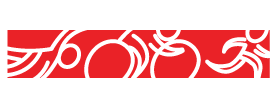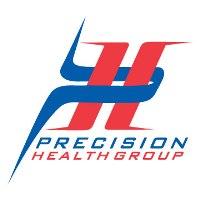If you’ve been to a local race, an open water swim practice, or even a speedwork session, chances are you’ve seen Precision Health Group’s tent there helping athletes to deal with the inevitable aches and pains of training or to provide post-race stretching and massage. In this installment of our continuing series of Q&A’s with our sponsors, we asked business manager, Tim Davila, about how they manage such a busy schedule and what sets them apart.
Tri Club: What year was Precision Health Group established?
Tim Davila: Dr. (Matthew) Lytle and Dr. (Bryan) Rasch have been in practice for 11+ years and PHG was established in 2010.
TC: We often see PHG at several races throughout the year offering stretching and massages. In 2015, how many races will you have a presence at?
TD: We attend about 75 events a year including races, lectures and classes that we teach.
TC: Are you working virtually every weekend of the year?
TD: Almost☺
TC: How do you decide which races to attend and support?
TD: We have built relationships with some of the best events in the area and enjoy supporting those businesses and the athletes. We choose our races based on previous relationship, distance, cause, availability, and the need for our services.
TC: Those portable heaters are lifesavers both before and after bone-chilling winter races. Whose idea was it to acquire them and bring them to the races?
TD: The Doctors after suffering in a couple of cold weather races☺
TC: How do you juggle that schedule: seeing patients in the clinic Monday-Friday, supporting races on weekends and training events on some weeknights?
TD: An amazing staff and very understanding families that understand our commitment to excellence.
TC: It is not our imagination to see PHG simultaneously at two events on the same day. Has this always been the case or was it a strategic decision to have resources to support more than one race at a time?
TD: As we continued to support the racing community the need for our service has grown and therefore so has the equipment demand. We simply met the demand and continue to focus on providing excellent event services.
TC: How has all of that visibility helped your practice?
TD: It has given us the opportunity to educate the athletic community of another treatment option that returns the athlete back to competition as fast as possible.
TC: What percentage of your patient population is made up of endurance athletes?
TD: 70%
TC: How stubborn are triathletes compared to other endurance athletes you see in the clinic?
TD: The athletic mindset is true for all endurance athletes, which is to push the envelope. It is a rewarding group because they want to get better and back to their event. It also requires a lot of reigning in when the injury requires it, which is frustrating for the athlete.
TC: What are some of the more common injuries you treat and do you notice an increase in volume in those injuries during certain times of the year? (For example, spring/fall marathon training seasons?)
TD: The most common areas we treat are hip, knee, Achilles (ankle), shoulder, spine. Injuries go up when athletes are training hard, which means we are busier from late February through early December.
TC: How often do you hear back from patients who have completed treatment after a notable personal achievement or milestone?
TD: Quite often. We love hearing the success stories of our patients and encourage them to continue to work toward personal goals.
TC:Why is muscle adhesion one of the most underdiagnosed conditions if it is also one of the most common?
TD: The treatment is difficult to do well and most physicians don’t have that skill set, and therefore don’t look for it.
TC: Your slogan is “Think Differently. Treat Differently”. What makes Precision Health different from conventional thinking and treatment?
TD: We utilize a complete biomechanical diagnostic process that respects the patient’s entire condition. We don’t look only to what we can fix, but rather the entire problem. This allows us to completely resolve the patient’s condition
TC: How much of the practice is made up of referrals from other patients or clinicians?
TD: A majority. The greatest compliment someone can give us is to trust us with the health of their friends and families.
TC: Walk us through the process when a patient comes in for an initial evaluation visit?
TD: The front office (Matt, Sarah, Karen Sue) will greet them and handle all of the paperwork. The patient then meets with the doctor (Dr. Lytle or Dr. Rasch), which entails a complete history, movement and function exam, review of records, and report of findings and treatment plan. The patient schedules a follow up for treatment to begin.
Many thanks to Tim for taking the time to answer our questions. We’re glad to have Precision Health Group in our corner helping us get back to training and racing as quickly and efficiently as possible. Remember that fees are waived for club members during their initial consultation. Like them on Facebook and follow them on Twitter.





